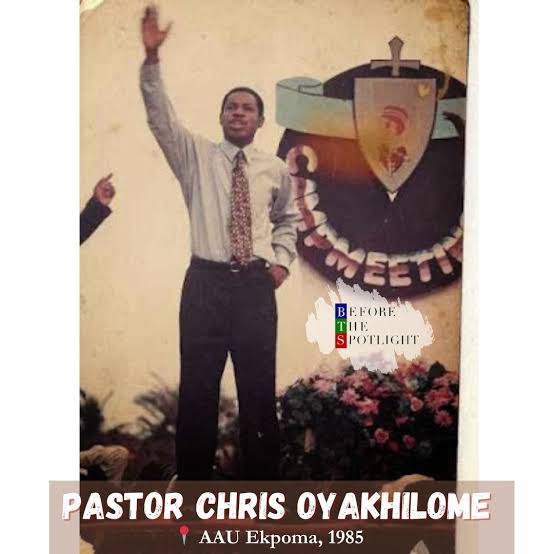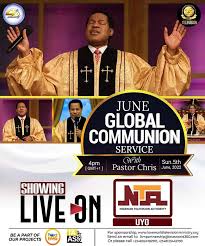It began like every other night on Nigerian television—routine headlines, government bulletins, the tired rhythm of state programming. The NTA logo glowed faintly, steady as habit. Then the air changed.
A new voice came through—measured, radiant, and strangely intimate. It wasn’t the tone of a newscaster or an anchor. It was alive. The man speaking was Pastor Chris Oyakhilome, and though he wasn’t inside the studio, his presence seemed to rearrange it.
For reasons no producer could explain, the sound felt different—rounder, deeper, almost luminous. The air between the transmitter and the television seemed to thicken with attention. Across cities, families paused mid-dinner, unsure whether what they were hearing was a sermon, a song, or something else entirely.
In that instant, bureaucracy met something beyond its script. That was how the intersection began—not with thunder, but with transmission. A preacher’s voice had entered the machinery of the state, and something unseen had entered the nation’s story.
Blueprint of a Voice That Refused to Stay Local
Long before satellites carried his sermons into homes across continents, Pastor Chris Oyakhilome’s journey began in the quieter corners of Benin City, where conviction met curiosity. Born on December 7, 1963, in Edo State, he grew up in a family where faith wasn’t a performance but a pulse. His father, Elder T.E. Oyakhilome, was one of the pioneers of the Assemblies of God Church in Benin, and his mother, Angelina, carried a tenderness that taught devotion not through words, but through warmth. It was in that house that young Chris learned that prayer wasn’t noise; it was navigation — a way of mapping the unseen before walking into it.
As a student at Ambrose Alli University in Ekpoma, he studied architecture — a discipline that later informed more than his sermons. To him, ministry was structure. Every soul was a blueprint. Every message, a pillar. And every revelation demanded design. He founded the Believers’ LoveWorld Fellowship — the seed that became Christ Embassy — not as an institution but as an ecosystem, a place where the intangible took form. Those early gatherings carried a strange electricity: faith meeting intellect, scripture meeting science, spirit meeting strategy.
But the architecture of his calling was never built on charisma alone. It was built on rhythm — a cadence that treated the Word like water, flowing into any vessel that thirsted. His biography is not a tale of fame found, but of faith formed. In lecture halls, he preached. In hostels, he prayed. And in the spaces between, he began to understand something the era had not yet caught up with — that the world was moving toward sound, and the next great move of God would travel through frequency, not just fellowship.

By the 1990s, Nigeria was shifting — economically, politically, spiritually. The youth were searching for meaning in a nation learning to balance democracy with disillusionment. Pastor Chris stood at the crossroads of that yearning — not as a politician or performer, but as a translator of divine intention. He wasn’t merely teaching the gospel; he was tuning the generation. And every sermon, every prayer, every prophecy began to sound like a rehearsal for something larger — a ministry that needed not just a pulpit, but a platform.
That realization soon collided with technology, television, and time. The stage was preparing itself, quietly, for the transmission of belief.
Airspace of Faith
By the time Atmosphere for Miracles began appearing on national television, Nigeria’s broadcast system was undergoing a quiet revolution. Satellite dishes were sprouting on rooftops, and private channels like AIT and Silverbird were beginning to challenge NTA’s monopoly. The 1990s were the age when television discovered charisma — when politics, entertainment, and religion began competing for the same emotional space.
Pastor Chris understood that shift earlier than most. His ministry had mastered the art of presence — not just on the pulpit, but on camera. The voice modulation, the timing of gestures, the cinematic use of music — they all reflected a preacher who knew that television was not merely a medium; it was a ministry on its own. While others saw airtime as privilege, he saw it as prophecy delivered through frequency.
When his tapes first reached NTA’s programming department, they did not arrive as rebellion. They arrived as request — properly labelled, time-coded, technically sound. But in those reels lay a new philosophy of evangelism. It was the gospel translated into broadcast syntax. And that translation came with consequences.
Some NTA officials were impressed by the production quality; others were uneasy about the fervor. They had never aired something so commanding — a message that turned television into testimony. Yet the pressure to modernize was growing. Viewers were migrating to newer networks. Audiences wanted life, not lecture. NTA, bound by bureaucracy but aware of public hunger, had to make a choice: remain the old voice of order or adapt to the new language of spirit.
That was how bureaucracy yielded, cautiously, to prophecy. Atmosphere for Miracles began to air. And once it did, Nigeria’s national conversation about faith would never sound the same again.
The Bureaucratic Dilemma
Inside NTA, decisions were rarely spiritual — they were administrative. Every second of broadcast had to pass through layers of approval. Programming had to align with national ethics codes, maintain political neutrality, and avoid “undue religious emphasis.” But the Christ Embassy broadcasts complicated those rules. They were emotional, visually captivating, and unabashedly supernatural. Healing scenes drew tears, testimonies blurred the line between documentary and divine, and viewers began to tune in as though salvation itself had a time slot.
What started as a Sunday filler slot soon became a national ritual. Ratings rose, letters flooded in, and calls poured from across the country. Viewers wanted more — more of the voice that promised possibility, more of the miracles that made faith feel tangible. NTA executives, used to handling programming by logic and law, found themselves negotiating with mystery.
Critics inside the institution argued that television should not be an altar; others warned that ignoring such massive public interest would make NTA obsolete. Somewhere between those debates, Pastor Chris’s broadcasts kept running — quietly, powerfully, persistently. The airwaves, once guarded by formality, were now alive with fervor.
It wasn’t that NTA suddenly became a religious station. It was that it couldn’t deny what was happening on its screens. Bureaucracy, by nature, manages flow; prophecy, by nature, breaks it. And in that tension, Nigerian television was reborn.

When Faith Found Its Frequency
To understand the magnitude of that moment, one must remember what Nigerian television was before Pastor Chris’s era. For decades, it had functioned as an extension of state messaging — news, agriculture, national events, and cultural education. The tone was formal, the camera static, the script predictable. Viewers watched, but few felt.
Pastor Chris changed that dynamic. His programmes were choreographed faith — structured like drama, paced like poetry. There was movement, rhythm, silence, crescendo. Viewers didn’t just hear the message; they experienced it. And in that experience, something profound occurred: television stopped being a tool of information and became a vessel of inspiration.
Even those who didn’t share his beliefs recognized the brilliance of the production. Every healing clip, every testimony, every visual was crafted with precision. To some, it felt manipulative; to others, it was revolutionary. But no one could look away.
Across the nation, small churches began recording their own messages, inspired by his format. Camera rentals increased. Editors found new work cutting sermons into sequences. What had begun as a simple NTA slot became a template for the digitization of faith. In a country fragmented by ethnicity, politics, and poverty, Atmosphere for Miracles became a rare unifying experience — everyone, believer or skeptic, had an opinion on Pastor Chris.
And yet, behind the sensation, the central irony remained: this global spiritual movement had begun through the same bureaucratic gatekeepers who once dismissed religious fervor as unsuitable for state television. Bureaucracy, unknowingly, had licensed prophecy.
Miracles Through the Monitor
No preacher of his generation understood the camera lens quite like Pastor Chris. He treated it as an extension of the pulpit — an invisible witness that could translate the spiritual into the visual. In Atmosphere for Miracles, he spoke directly to the lens as though addressing a soul. The effect was intimate, almost cinematic. Each miracle segment was carefully edited to balance emotion and evidence. Crutches fell, tears flowed, choruses erupted — and millions of Nigerians sat before their screens, suspended between skepticism and surrender.
Behind every broadcast, however, there was also conflict. Government regulators began tightening policies around televised healing, citing ethics and potential exploitation. NTA itself faced pressure to limit the duration of such content. But the demand was overwhelming. Viewers sent testimonies by mail, by fax, by word of mouth. Wherever the signal reached, faith followed.
When regulatory friction intensified in the early 2000s, Pastor Chris expanded beyond NTA. Satellite television became his new cathedral. LoveWorld Television Network was born — a system where no gatekeeper could mute the message. But long before that independence, it was NTA that gave prophecy its first amplifier.
Those early broadcasts were imperfect, sometimes censored, often delayed. Yet they achieved what years of crusades couldn’t: they made a preacher a household name, and faith a national conversation.

From Tape to Satellite: The Birth of LoveWorld Media
As regulatory scrutiny increased in the early 2000s, Pastor Chris Oyakhilome faced a defining decision: to remain dependent on NTA’s bureaucratic goodwill or to build a media house that answered only to its mission. The choice was prophetic and practical at once. LoveWorld Television Network was born—not as rebellion, but as revelation fulfilled. What began as a half-hour programme on state television evolved into a global broadcasting empire, beaming from Johannesburg to London, Lagos to Houston.
The transition was seamless but strategic. Having learned from years of dealing with NTA’s broadcast schedules, Pastor Chris and his media team understood both the technical and cultural grammar of television. They built studios that mirrored professionalism, invested in satellite infrastructure, and trained an in-house generation of producers, directors, and editors. LoveWorld was not merely a church channel; it was a spiritual ecosystem powered by technology. In a continent where governments owned signals, a preacher had created his own constellation.
Yet, paradoxically, it was the experience with NTA that had made this independence possible. Bureaucracy had taught prophecy the mechanics of transmission—how signals travel, how frames tell stories, how structure sustains message. LoveWorld, though autonomous, carried within it the discipline of state broadcasting refined through revelation. It was a fusion of formality and faith—a meeting of the institutional and the inspired.
By the mid-2000s, Atmosphere for Miracles was no longer just a television programme; it was a time zone. Across Africa, viewers adjusted their schedules around it. In diaspora communities, it became a ritual of reconnection to home. Governments changed; media laws evolved; but the broadcasts remained. The same airwaves that once resisted prophecy were now filled with it, transmitted not through approval, but through innovation.
Faith in High Definition
When Nigeria migrated to digital broadcasting, many saw it as a technological milestone. For Pastor Chris, it was spiritual evolution. High-definition television brought clarity to what his followers already believed: that faith had substance. The visual sharpness of his broadcasts amplified the intimacy of his message. Each gesture, each expression, each moment of silence carried weight. Television had matured, and so had the ministry that once fought for seconds of airtime.
In this new era, Pastor Chris became less of a guest on NTA’s platform and more of a teacher to the industry itself. His studios in Lagos and Johannesburg set new production benchmarks. Religious television, once treated as an afterthought, now demanded the same respect as news or drama. Competitors tried to imitate his format, but few could replicate the precision with which he balanced performance and prayer. To his followers, he wasn’t performing at all; he was translating the divine into visual rhythm.
The irony was poetic. The preacher once filtered through NTA’s bureaucratic pipeline had now become the architect of a broadcast empire. The state had rules; he had revelation. Yet both operated on the same technology—a reminder that divine messages can travel through human machinery. In that coexistence lay a truth about Nigeria’s faith culture: spirituality thrives not in isolation but through adaptation.
By the late 2010s, LoveWorld had outgrown the old grammar of television altogether. It became multi-platform, transcending screens into smartphones and social streams. The same bureaucratic medium that once confined his message had now become borderless. Faith had found a frequency that even bureaucracy couldn’t jam.
The Legacy of Transmission
In hindsight, Pastor Chris’s early broadcasts on NTA weren’t merely about ministry—they were about national memory. They marked the point where religion stopped being private ritual and became public spectacle. Nigeria, always spiritual by temperament, had found in him a televised mirror of its collective longing. He represented what the post-colonial media age had promised but never delivered: a voice unafraid to merge revelation with reason.
Inside NTA’s archives today, those early tapes still exist—grainy footage of miracles, testimonies, and sermons that once confounded producers. They are historical artifacts, reminders of the night prophecy found its first bureaucratic microphone. To younger broadcasters, they are blueprints; to older ones, they are ghosts of a time when faith breached the fortress of policy. Either way, their significance endures.
For Pastor Chris, the story wasn’t about triumph over bureaucracy but about transformation through it. Bureaucracy gave his message structure; prophecy gave it soul. Together, they birthed a new genre—the spiritual documentary, a blend of devotion and documentation that redefined what it meant to witness. Every time the NTA transmitter carried his voice, it unknowingly rewired a nation’s spiritual circuitry.
And long after regulations changed, after satellites replaced towers, after private media overtook public, the echo of that moment remained. Bureaucracy had done what it never intended—it became the messenger of the message it could not fully comprehend.
Takeaway: The Unwritten Frequency
History will not remember the cables, the contracts, or the call times. It will remember a feeling—how something unseen once moved through an ordinary screen and made people believe the invisible could be televised.
Long before hashtags and livestreams, one man turned attention into encounter. He taught a restless generation that faith was not a schedule, but a presence—that the spirit could arrive unannounced, even through static. That moment did not end when the programme did; it lingered, quietly reprogramming what Nigerians thought television could mean.

Pastor Chris Oyakhilome didn’t invent the medium—he interrupted it. He made technology kneel. And in doing so, he left a question vibrating between faith and machinery, a question that still refuses to fade:
When prophecy finally finds a microphone, who really speaks—the man, the message, or the nation that needed to hear it?





